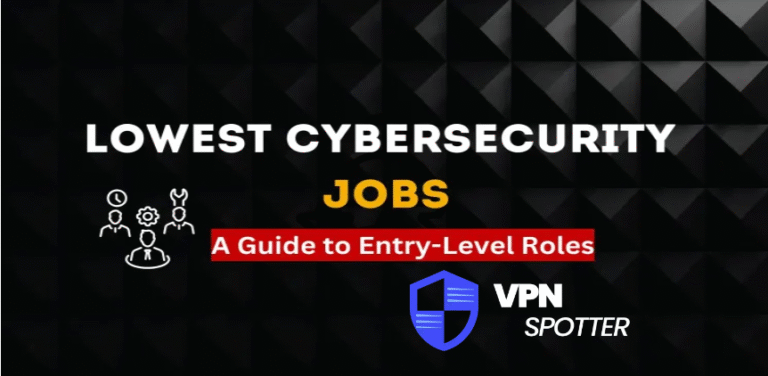With the ever-increasing reliance on digital technologies, cybersecurity has famous as one of the most critical and fastest-growing sectors across in the whole world. As organizations shift their operations online and store Grey data digitally,We need to defend these assets has become supreme. therefor, the demand for cybersecurity professionals is at an all-time high in the world. For individuals looking to break into this industry, entry-level cybersecurity jobs extend a promising pathway filled with growth chances, job security, and competitive compensation and can change our like in the short period .
This latest content aims to provide you a thorough understanding and latest knowledge of entry-level cybersecurity roles. We will delve into the types of roles available, the required skills and certifications, how to build experience in this, job search strategies, salary expectations, and long-term career prospects. Whether you’re a recent graduate, career changer, or self-taught enthusiast, In this latest article will equip you with the knowledge needed to launch your cybersecurity career in 2025.
Why Cybersecurity is a Critical Field
The digital modification of businesses, governments, and individuals has transformed how data is created, shared, and stored. While these advancements have gained convenience and efficiency, they have also given rise to sophisticated cyber warning. Cybercriminals utilize vulnerabilities in network to thieve data, disrupt operations, and demand ransoms. In response, cybersecurity has advanced into a complex discipline focused on focusing information systems from unauthorized access, attacks, and damage.
Key reasons cybersecurity is critical include:
Data Protection: Safeguarding sensitive personal, financial, and corporate data from violation and theft.
Business Continuity: Make sure that businesses can run without disruptions caused by cyberattacks.
Regulatory Compliance: Bond to laws and worth that require secure grip of information.
National Security: Protecting infrastructure and intelligence systems from foreign and national cyber threats.
Benefits of a Cybersecurity Career
Selecting a career in cybersecurity offers numerous advantages:
High Demand: There is a global shortage of skilled cybersecurity professionals, making job prospects abundant, hum amount is there.
Job Security: Cybersecurity roles are less likely to be outsourced or automated.
Attractive Salaries: Even entry-level positions offer competitive pay.
Dynamic Work: Cybersecurity professionals face constantly evolving challenges, preventing monotony.
Career Growth: Numerous specialization options exist, including penetration testing, threat intelligence, and risk management.
Understanding Entry-Level Cybersecurity Jobs
Entry-level roles are designed for individuals with limited experience in cybersecurity. These roles typically involve supporting more senior staff, learning security tools and techniques, and gradually taking on more responsibility. Common entry-level job titles include:
Security Analyst
Security analysts are responsible for monitoring networks and systems for potential threats. They analyze logs, respond to incidents, and help enforce security policies. It is often considered a foundational role in cybersecurity.
SOC Analyst (Security Operations Center Analyst)
SOC Analysts work in teams to monitor real-time security alerts and coordinate the initial response to threats. Tier 1 analysts handle the first line of defense, escalating more serious incidents to senior team members.
IT Support Technician with Security Duties
In smaller organizations, IT support staff may also be responsible for implementing and maintaining security measures, such as configuring firewalls, antivirus software, and user access controls.
Network Administrator
While traditionally a networking role, network administrators often overlap with security by implementing secure network configurations, monitoring traffic, and ensuring firewall rules are effective.
Junior Penetration Tester (Ethical Hacker Assistant)
These professionals assist in vulnerability assessments, penetration testing exercises, and reporting findings. The role requires knowledge of systems and common exploits.
Compliance Analyst
Compliance analysts ensure that the organization adheres to security standards and regulations like GDPR, HIPAA, or PCI-DSS. The role involves auditing, documentation, and collaborating with legal teams.
Risk Analyst
A risk analyst identifies potential risks to data and systems, assesses their impact, and recommends mitigation strategies.
Required Skills and Competencies
Entry-level cybersecurity professionals need a blend of technical knowledge, analytical thinking, and communication skills. Here are key competencies to develop:
Technical Skills
Operating Systems: Familiarity with Windows, Linux, and macOS.
Networking: A full guide of TCP/IP, DNS, firewalls, VPNs, and routing.
Security Tools: The best basic knowledge of tools like Wireshark, Nessus, and Splunk.
Programming/Scripting: Python, PowerShell, Bash, or JavaScript can help automate tasks and understand exploits.
Cloud Security Basics: Introduction to securing AWS, Azure, or Google Cloud environments.
Soft Skills
- Problem-Solving: Ability to think critically and address issues logically.
- Communication: Conveying complex issues to technical and non-technical audiences.
- Attention to Detail: Small misconfigurations can lead to significant vulnerabilities.
- Teamwork: Collaborating with IT, developers, and other departments.
Educational Pathways
There are multiple educational paths to start a cybersecurity career:
Traditional Degree Programs
Associate Degrees: Focused programs that provide technical training in cybersecurity or IT.
Bachelor’s Degrees: Broader education in computer science, information systems, or cybersecurity.
Bootcamps
Cybersecurity bootcamps are intensive programs that prepare individuals in a few months. Many include job placement support and hands-on labs.
Self-Directed Learning
Numerous free and paid resources are available online. Platforms like Cybrary, TryHackMe, and Hack The Box offer interactive, scenario-based training.
Industry Certifications
Certifications validate your skills and can improve your chances of landing a job. Popular entry-level certifications include:
CompTIA Security+: Covers essential security concepts and practices.
CompTIA Network+: Focuses on networking, which is foundational for security.
Certified Cybersecurity Entry-Level Technician (CCET): Generated for beginners learners by ISC2.
Cisco Certified CyberOps Associate: Offers foundational SOC skills.
Microsoft SC-900: Security, Compliance, and Identity fundamentals.
Advanced certifications (after gaining experience):
Certified Ethical Hacker (CEH)
Certified Information Systems Security Professional (CISSP)
Gaining Experience
One of the main challenges for beginners is getting hands-on experience. Here are some ways to make your practical knowledge:
Home Lab
Start a virtual lab using software as VirtualBox or VMware. Practice configuring firewalls, attacking and defending vulnerable machines, and monitoring traffic.
Open Source Contributions
Contribute to security projects on GitHub to gain real-world exposure and improve your portfolio.
Internships
Look for internships or apprenticeships with companies offering security services. Even unpaid opportunities can be valuable.
Capture The Flag (CTF) Competitions
Joining in online competitions that test your cybersecurity knowledge and problem-solving abilities.
Freelance Projects
Offer to secure systems for small businesses or volunteer for nonprofits.
Job Search Strategies
Build a Strong Resume
Highlight relevant skills, certifications, projects, and any practical experience. Tailor your resume for each application.
Create an Online Presence
Maintain an up-to-date Linked-In profile and customize profile. Consider building a personal blog to share your learning journey, tools, and tutorials.
Use Job Boards
Monitor platforms like:
- Indeed
- CyberSecJobs
- Dice
- ClearanceJobs (for government positions)
Network in the Industry
Join cybersecurity forums, attend webinars, and participate in local security meetups. Connections often lead to job opportunities.
Apply Strategically
Apply for roles that list required skills you possess. Don’t be discouraged by job descriptions asking for 2-3 years of experience—many employers are flexible if you demonstrate initiative and skills.
Entry-Level Salary Expectations
Cybersecurity roles are among the most best well-paid in the tech industry, even at entry level. Salaries vary based on location, industry, and education:
United States: $55,000 to $75,000 annually
Europe: €35,000 to €60,000
Asia: Varies widely; urban centers provide competitive packages
Remote Jobs: May offer international rates with flexible benefits
As you gain experience I this field and certifications, your salary can increase significantly, with mid-level roles earning $80,000 to $120,000 or more in a year.
Career Progression
After gaining experience in an entry-level role, you can specialize in various fields:
Penetration Tester
Focuses on ethical hacking and vulnerability assessments.
Security Engineer
Designs secure systems and develops policies to protect against threats.
Incident Responder
Handles active breaches and conducts post-incident analysis.
Cloud Security Specialist
Secures cloud-based infrastructure and services.
Threat Intelligence Analyst
Studies threat actors and advises on risk mitigation strategies.
Cybersecurity Manager
Leads teams, develops policies, and oversees overall security strategy.
Challenges in the Cybersecurity Field
Despite its rewards, cybersecurity has its challenges:
Continuous Learning: The field evolves rapidly, requiring constant upskilling.
Stressful Incidents: Responding to breaches can be high pressure.
Work-Life Balance: On-call duties and late-night monitoring can be demanding.
Imposter Syndrome: Many beginners doubt their abilities due to the complexity of the field. Confidence builds with practice.
Tips for Longtime Success in this digital Era
- Set short- and long-term learning goals.
- Stay informed with industry news via blogs, podcasts, and newsletters all times.
- Join professional organizations like (ISC)2, ISACA, or local chapters.
- Find a mentor or best teacher to guide you through your career.
- Celebrate milestones and build a support network.
Conclusion
Cybersecurity providing a fulfilling and future-proof career path for those willing to invest time in learning and skill development, who want to make their future. Entry-level jobs in this field provide the foundation needed to grow into highly specialized and well-compensated roles. Whether you choose to pursue formal study, certifications, or self-study, the key to success lies in your curiosity, commitment, and consistent effort.
If you’re ready to protect systems, battle cyber threats, and wanna make a difference in the digital world, now is the perfect time to start your journey into cybersecurity. The path may be challenging and take your time, but the rewards are immense—financially, professionally, and intellectually.

